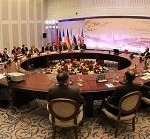Readers who recall that in 2009 a new U.S. President seemed eager to defuse the West’s quarrel with Iran over its nuclear activities may wonder why we are all still waiting for white smoke. I have a hunch it has something to do with a lack of realism on one side and a profound mistrust on the other.
The lack of realism is a Western failing. The U.S. and the two European states, France and the UK, that still shape the EU’s Iran policy, ten years after the International Atomic Energy Agency (IAEA) first reported certain Iranian nuclear safeguards failures (long since corrected), have been reluctant to concede Iran’s right to possess a capacity to enrich uranium.
These Western powers know that the treaty which governs the use of nuclear technology for peaceful purposes, the Nuclear Non-Proliferation Treaty (NPT), does not prohibit the acquisition of uranium enrichment technology by the treaty’s Non-Nuclear-Weapon States (NNWS).
They know that several NNWS already possess this technology.
They know that the framers of the treaty envisaged that IAEA monitoring of enrichment plants would provide the UN Security Council with timely notice of any NNWS move to divert enriched uranium to the production of nuclear weapons.
They know that their intelligence agencies judge that Iran abandoned a nuclear weapons programme in 2003.
Nonetheless, (for reasons spelled out in the unabridged version of this article) they cannot bring themselves to adopt a realistic policy of accepting Iran’s rights, relying on IAEA safeguards for timely detection, and minimising through intelligent diplomacy the risk of Iran’s leaders deciding to abuse a dual-use technology.
On the Iranian side, the lack of trust in the U.S.’ good faith has become increasingly apparent. It is a hall-mark of Iran’s supreme decision-taker, Ayatollah Khamenei.
As recently as 20 March, he said: “I am not optimistic about talks [with the U.S.]. Why? Because our past experiences show that talks for the American officials do not mean for us to sit down and reach a logical solution … What they mean by talks is that we sit down and talk until Iran accepts their viewpoint”.
This distrust has militated against progress by making Iran’s negotiators ultra-cautious. Instead of volunteering confidence-building measures, they have camped on demanding that Iran’s rights be recognised and nuclear-related sanctions lifted.
This distrust has been fuelled by the Western tactic of sanctions to coerce Iran into negotiating on Western terms, since sanctions have sowed doubts in Ayatollah Khamenei’s mind about the West’s real intentions, and Western Ministers have come to see sanctions as precious possessions, to be hoarded as long as possible. It sometimes seems as though causing hardship has ceased to be a means to an end for the West; it has become a mark of Ministerial success in coercing much of Asia into following the West’s lead.
Many of these factors have been visible during the latest round of talks with Iran, in Kazakhstan, on 5 and 6 April.
The Christian Science Monitor reported on 4 April that the U.S., EU, Russia and China would demand:
– the suspension of all enrichment above 5%;
– the disposal of Iran’s stock of 20% U235;
– the downgrading of the well-protected Fordow enrichment plant to a state of reduced readiness;
– the acceptance of enhanced IAEA monitoring of Iranian facilities.
In exchange they would offer to suspend sanctions on gold, precious metals and the export of petrochemicals; civil nuclear cooperation; and spare parts for U.S.-made commercial aircraft.
The initial Iranian response on 5 April irritated the Western negotiators: the Iranians failed to react directly to their proposals. Instead the Iranians reiterated their demand for the recognition of Iran’s rights and the lifting of all sanctions as preconditions for any short-term confidence building curbs on Iran’s 20% enrichment activities.
On the second day, however, according to AlMonitor on 6 April, Iran “pivoted to arguing for a better deal.” “I’ve never seen anything quite like it,” a U.S. diplomat said. “There was intensive dialogue on key issues at the core of [the proposed confidence building measures].”
Will that pivot be a turning-point? The latest proposal clearly falls far short of what Iran seeks by way of clarity that it can retain a dual-use enrichment capability, and by way of relief from oil and financial sanctions. There has been no sign that the U.S. and EU can bring themselves to offer significant movement on either of these points.
Yet a scintilla of hope can be drawn from the fact that on 6 April there may have been the beginnings of a long-awaited haggle.
And just conceivably Western Ministers will allow themselves to be struck by contrasts between Iran and North Korea. Iran has not withdrawn from the NPT, or expelled IAEA inspectors. It has threatened no one with nuclear aggression. It has not tested nuclear devices. Its leaders have been certified by U.S. intelligence as “rational actors” whose decision-making tends to be cost/benefit based.
Ambassador Peter Jenkins is a former British diplomat who worked on the Iranian nuclear issue when ambassador to the International Atomic Energy Agency in Vienna (2001-06).
This is the abridged version of an article originally published by Fair Observer on 10 April 2013, and is republished with permission from the Author. The unabridged version can be accessed here.


